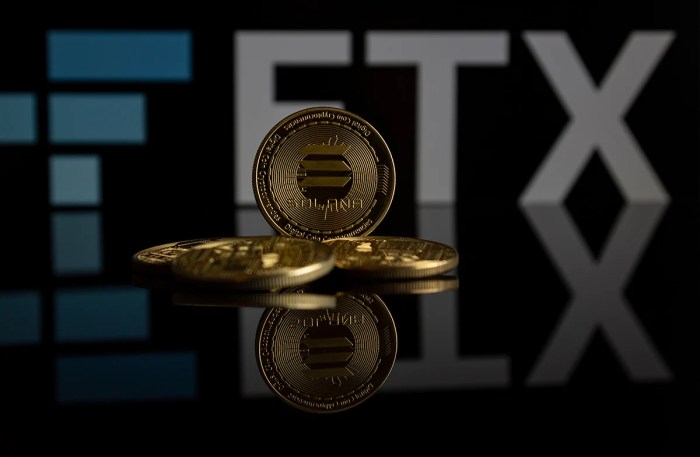Oregon sues Coinbase over claims it sells unregistered securities, igniting a legal battle that could reshape the cryptocurrency landscape. This case highlights the ongoing struggle to regulate digital assets, particularly concerning the definition and sale of securities within the burgeoning crypto market. Oregon alleges Coinbase is facilitating the trading of unregistered securities, potentially exposing investors to significant risks.
The legal battle promises to be complex, with both sides presenting compelling arguments about the nature of cryptocurrencies and their place in the traditional financial system.
The lawsuit centers on whether certain crypto assets offered by Coinbase are considered securities under US law. Oregon contends they are, arguing this violates securities regulations. Coinbase, conversely, argues its offerings are not securities, asserting a different legal classification. This fundamental disagreement lays bare the challenges in applying existing securities laws to a novel asset class like cryptocurrencies.
Background of the Case
Oregon’s lawsuit against Coinbase, a major cryptocurrency exchange, centers on allegations that the platform facilitates the sale of unregistered securities. This claim, if proven, could have significant implications for the cryptocurrency industry, potentially impacting how investors perceive and engage with digital assets. The state’s action underscores the ongoing debate surrounding the classification of cryptocurrencies and the regulatory landscape surrounding their trading.The crux of the matter is whether certain cryptocurrencies sold on Coinbase constitute “securities” under US law.
Oregon contends that these digital assets meet the criteria for securities, meaning their sale and trading should be regulated in a manner consistent with traditional financial instruments. This challenge to Coinbase’s operations highlights the growing regulatory uncertainty surrounding cryptocurrencies.
Specific Allegations
Oregon argues that specific cryptocurrencies listed on Coinbase’s platform qualify as unregistered securities. This claim hinges on whether these cryptocurrencies meet the definition of an investment contract, a legal term encompassing various forms of financial instruments. The state likely asserts that the tokens’ characteristics, such as their potential for profit through the efforts of others, satisfy this criteria.
This is a complex legal issue, as determining whether a digital asset is a security requires careful examination of its specific features and the context of its offering.
Legal Framework
The legal framework governing the sale of securities in the US is multifaceted, encompassing various federal and state laws. The Securities Act of 1933 and the Securities Exchange Act of 1934 are foundational pieces of legislation. These statutes generally require the registration of securities offerings to protect investors from fraud and manipulation. The Howey Test, a cornerstone of securities law, is frequently applied to determine whether a particular investment contract is a security.
“The Howey Test, established by the Supreme Court in the case of Securities and Exchange Commission v. Howey Co., provides a framework for determining whether an investment contract constitutes a security.”
The Howey Test examines whether an investment involves an investment of money in a common enterprise with the expectation of profits derived solely from the efforts of others. This legal standard often plays a critical role in deciding if cryptocurrencies are classified as securities.
Comparison with Previous Cases
Several cases have addressed the issue of classifying cryptocurrencies as securities. The outcomes of these cases have varied, reflecting the evolving understanding of the regulatory landscape surrounding digital assets. Some courts have ruled that certain cryptocurrencies are securities, while others have reached different conclusions, highlighting the complexities and subtleties involved in this area of law.A crucial aspect of comparing this case to previous ones is analyzing the specific characteristics of the cryptocurrencies at issue.
The tokens’ underlying technology, the nature of their distribution, and the marketing strategies employed during their sale will all be important considerations. The state will likely rely on similar cases to support its claim, pointing to instances where other courts have classified similar assets as securities.
Key Players and Their Roles
The key players in this dispute include the State of Oregon, Coinbase, and potentially other cryptocurrency exchanges and developers involved in the issuance or sale of the relevant cryptocurrencies. The State of Oregon is the plaintiff, initiating the legal action. Coinbase is the defendant, the target of the lawsuit. Other relevant parties might include investors who have purchased the tokens in question.
Their roles and interests will likely shape the legal proceedings.
Coinbase’s Response and Arguments
Coinbase, facing the Oregon Attorney General’s lawsuit, has articulated its defense, arguing that its products are not unregistered securities. Their response emphasizes the distinct nature of their offerings and the existing regulatory frameworks that govern their operations. This response Artikels Coinbase’s counter-arguments, shedding light on the potential implications of the ruling.Coinbase’s response to the Oregon lawsuit centers on the classification of its products.
They maintain that the digital assets they facilitate are not securities, and that the state’s allegations are misinterpretations of the relevant regulations. This stance reflects their belief in the legality of their business model and their position within the evolving regulatory landscape of the cryptocurrency industry.
Coinbase’s Official Response
Coinbase’s official response to the Oregon lawsuit asserts that the digital assets they facilitate, such as Bitcoin and Ethereum, are not securities. They argue that these assets are commodities or other forms of digital property, not investments in a company or enterprise. The company maintains that its business model falls within the existing regulatory frameworks governing the exchange of commodities and other digital assets.
Counter-Arguments Regarding Product Classification
Coinbase contends that the Oregon Attorney General’s classification of their products as unregistered securities is flawed. They argue that the definition of a “security” is not universally applicable to digital assets and that a more nuanced approach is necessary to properly categorize them. The company emphasizes that the characteristics of digital assets differ from traditional securities, and that existing legal precedents do not definitively establish them as securities.
Coinbase’s Stance on the Legality of Their Business Practices
Coinbase maintains that its business practices are legal and compliant with existing regulations. They assert that their platforms operate within the boundaries of relevant laws, and that the state’s allegations do not accurately reflect the nuances of the cryptocurrency market. They highlight the evolving nature of the regulatory landscape and the ongoing debate surrounding the proper categorization of digital assets.
Potential Implications of the Ruling for Coinbase’s Operations
A ruling against Coinbase could have significant implications for its operations. It could lead to restrictions on certain functionalities or services, potentially impacting its user base and market share. This could also affect the broader cryptocurrency industry, potentially discouraging innovation and hindering the growth of the sector. The precedent set by this ruling could be pivotal in shaping future regulatory approaches toward digital assets.
Comparison of Arguments
| Argument Category | Oregon’s Argument | Coinbase’s Argument |
|---|---|---|
| Product Classification | Digital assets on Coinbase’s platform are unregistered securities. | Digital assets facilitated by Coinbase are not securities, but rather commodities or digital property. |
| Regulatory Compliance | Coinbase’s practices violate securities laws. | Coinbase’s operations are compliant with existing regulations. |
| Legal Precedents | Existing legal precedents support the classification of digital assets as securities. | Existing legal precedents do not definitively establish digital assets as securities. |
Potential Impact on the Crypto Industry
The Oregon attorney general’s lawsuit against Coinbase, alleging the sale of unregistered securities, carries significant implications for the entire cryptocurrency market. This legal action, if successful, could reshape the landscape of crypto trading and investment, potentially impacting investor confidence and the overall regulatory environment. The case’s outcome will be closely watched by both industry participants and regulators worldwide.This legal challenge highlights the ongoing struggle to define and regulate cryptocurrencies within existing financial frameworks.
The outcome of the Oregon v. Coinbase case could establish precedents that will influence future regulatory actions and shape the future of the crypto industry.
Ramifications on the Broader Cryptocurrency Market
The Oregon lawsuit against Coinbase, alleging the sale of unregistered securities, carries significant ramifications for the broader cryptocurrency market. The case’s success could set a precedent for future regulatory actions, potentially leading to a stricter regulatory environment for crypto companies. This could result in increased compliance costs for crypto exchanges and companies, potentially driving some out of the market.
Oregon’s lawsuit against Coinbase over unregistered securities is a pretty big deal, right? It’s got everyone buzzing about the future of crypto. This kind of legal action highlights the complex issues surrounding digital assets and their regulation. It’s a fascinating legal battle to follow, especially when you consider the broader implications for the crypto market. Meanwhile, for a totally different take on things, check out the awesome discussions happening in the cowboy bebop community reddit anime netflix — it’s a wild ride! Ultimately, the question remains, how will this affect the future of crypto trading, and will it ultimately affect the overall regulatory landscape of digital assets?
The uncertainty created by this legal challenge could deter new entrants and investments in the industry, potentially impacting innovation and market growth.
Oregon’s lawsuit against Coinbase over unregistered securities sales is definitely grabbing headlines. Meanwhile, it’s interesting to see how the energy sector is shifting, with generator company Generac announcing plans to buy ecobee, generator company generac announces plans to buy ecobee. Still, the core issue remains the same: Oregon’s claims against Coinbase for selling unregistered securities.
Impact on Investor Confidence and Market Sentiment
The Oregon lawsuit’s impact on investor confidence is likely to be negative, at least in the short term. Uncertainty surrounding the legality and regulation of cryptocurrencies will likely create apprehension among investors, potentially leading to decreased trading activity and market volatility. The fear of regulatory scrutiny and potential legal repercussions could drive investors to seek safer, more established investment avenues, further impacting the crypto market’s overall sentiment.
The potential for significant legal repercussions for Coinbase, a well-known and established exchange, could lead to similar concerns about other crypto companies.
Potential Regulatory Changes or Implications
The Oregon lawsuit could trigger significant regulatory changes, potentially leading to stricter oversight and requirements for crypto exchanges and companies. States might adopt similar regulatory approaches, creating a fragmented and complex regulatory environment for crypto companies operating across multiple jurisdictions. The need for clear regulatory frameworks for cryptocurrencies is becoming increasingly apparent, as the lack of such frameworks creates uncertainty and potentially exposes investors to risk.
Analysis of Reactions from Other Jurisdictions
The outcome of the Oregon lawsuit is likely to influence regulatory responses in other jurisdictions. If the lawsuit succeeds, other states and countries might follow suit, adopting stricter regulations for cryptocurrencies. International regulatory cooperation and harmonization could emerge, or, conversely, jurisdictions might take differing approaches, creating further confusion and complexity for crypto companies. The potential for international legal challenges and the possibility of differing regulations in different countries could complicate the future of cross-border cryptocurrency transactions.
Potential Effects on Different Types of Cryptocurrencies
| Cryptocurrency Type | Potential Impact |
|---|---|
| Tokens classified as securities | Significant impact, potentially leading to restrictions on trading and listing on exchanges. This could severely impact the value and accessibility of these tokens. |
| Tokens classified as commodities | Likely to be less directly impacted, but could face scrutiny based on the standards used for classification. |
| Tokens classified as utility tokens | Could face less direct impact, but the case could still lead to stricter scrutiny of token offerings and trading activities. |
Legal and Regulatory Implications
The Oregon v. Coinbase case isn’t just about a single cryptocurrency exchange; it’s a crucial test case for how the U.S. Securities and Exchange Commission (SEC) and other regulatory bodies will interpret and enforce existing securities laws in the rapidly evolving digital asset space. The outcome will significantly impact the future of cryptocurrencies, shaping how businesses operate and investors approach these novel financial instruments.This case highlights the complexities of applying traditional securities laws to digital assets, a challenge regulators and legal experts continue to grapple with.
The implications extend beyond the immediate parties involved, affecting the broader cryptocurrency ecosystem and investor confidence.
Relevant Legal Precedents
The legal precedents surrounding the definition of a security are crucial in this case. The Supreme Court’s Howey test, established in the 1946 caseSEC v. W.J. Howey Co.*, remains the cornerstone for determining whether an investment contract constitutes a security. This test examines whether an investment is made in a common enterprise with a reasonable expectation of profits to be derived from the efforts of others.
Applying this test to digital assets, particularly tokens representing ownership or participation in a project, presents a significant challenge.
Implications for Future Crypto Regulation
The outcome of this case will likely influence the SEC’s approach to regulating cryptocurrencies. If the court rules that certain cryptocurrencies are securities, it could lead to more stringent regulations for digital asset exchanges, potentially requiring them to register with the SEC and comply with stricter reporting requirements. Conversely, a ruling against the SEC could signal a more permissive approach, leaving the market less regulated, which might attract more businesses but potentially also lead to increased investor risks.
Regulatory Landscape in the US
The current regulatory landscape in the US is fragmented and evolving. The SEC has been particularly active in asserting its jurisdiction over cryptocurrencies, while the Commodity Futures Trading Commission (CFTC) also claims oversight in some cases. This overlap creates uncertainty and prompts the need for clearer definitions and delineation of regulatory responsibilities. Different agencies taking different approaches can lead to inconsistent enforcement, potentially stifling innovation and investor confidence.
Key Legal Concepts in the Case
The following table illustrates the key legal concepts involved in the Oregon v. Coinbase case.
| Legal Concept | Explanation |
|---|---|
| Howey Test | A legal test used to determine whether an investment contract constitutes a security, focusing on the investment’s characteristics. |
| Securities Act of 1933 | A crucial piece of legislation governing the initial sale of securities, requiring registration for certain offerings. |
| Securities Exchange Act of 1934 | A complementary law to the 1933 Act, regulating the trading of securities after their initial offering. |
| Investment Contract | A contract that involves an investment of money in a common enterprise with a reasonable expectation of profit derived from the efforts of others. |
Potential Future Legislation
The need for clear and comprehensive crypto-specific legislation is growing. The current regulatory approach is often reactive and lacks the foresight necessary for a rapidly evolving sector. This case, and others like it, may push Congress to create dedicated legislation, potentially defining specific categories of digital assets and establishing clearer regulatory frameworks for their issuance and trading. For example, legislation could distinguish between tokens representing securities and those representing commodities or other assets.
Public Perception and Investor Behavior: Oregon Sues Coinbase Over Claims It Sells Unregistered Securities

The Oregon lawsuit against Coinbase, alleging the sale of unregistered securities, has undoubtedly sparked considerable interest and debate within the crypto community and beyond. The legal battle’s implications extend far beyond the courtroom, potentially reshaping public perception of cryptocurrencies and influencing investor decisions in the market. This analysis explores how the case is impacting public opinion and how investors might react to the legal developments.
Public Reaction to the Lawsuit
The Oregon lawsuit has garnered significant media attention, influencing public perception of Coinbase and the broader crypto market. Initial reactions have ranged from concern about potential regulatory crackdowns to calls for increased investor vigilance. Some commentators argue that the case highlights the need for greater clarity and regulation within the cryptocurrency sector, while others see it as a potential overreach of regulatory power.
The lawsuit’s impact on public sentiment is likely to be multifaceted, reflecting varying levels of knowledge and investment experience within the public.
Influence on Investor Behavior, Oregon sues coinbase over claims it sells unregistered securities
This legal action may lead to a variety of investor responses. Some investors might become more cautious and hesitant to engage in cryptocurrencies, particularly if they perceive increased regulatory risk. Alternatively, others may view the lawsuit as an opportunity to acquire crypto assets at potentially lower prices, anticipating potential market corrections. The long-term effects on investor behavior are difficult to predict, but the potential for volatility in the market is undeniable.
Factors Influencing Investor Decisions
Several factors are likely to play a crucial role in shaping investor decisions in the wake of the Oregon lawsuit. The perceived legitimacy of the allegations, the strength of Coinbase’s defense, and the broader regulatory environment are key considerations. Investor risk tolerance, understanding of the legal complexities, and personal investment goals will also significantly impact individual responses. Furthermore, the level of media coverage and public commentary surrounding the lawsuit will likely sway public opinion and affect investor confidence.
Impact of Media Coverage on Public Opinion
Media coverage plays a critical role in shaping public opinion and investor behavior. Positive or negative portrayals of the lawsuit, and of the cryptocurrency market in general, can significantly influence investor decisions. For example, if the media highlights the lawsuit as a potential catalyst for stricter regulations, it might discourage investors, potentially leading to a decline in the crypto market value.
Oregon’s lawsuit against Coinbase over unregistered securities sales is interesting, especially considering how Bitcoin is back hitting record high price. This surge in the crypto market might influence the outcome of the case, as investors are clearly bullish on the technology. The question now becomes whether this recent market performance will sway the courts’ view on the legitimacy of Coinbase’s practices in the face of the Oregon lawsuit.
Conversely, if the coverage focuses on the robustness of Coinbase’s response or the inherent complexities of the case, it could potentially mitigate investor concerns. The nuanced portrayal of the legal battle in the media is crucial in influencing public perception.
Potential Investor Reactions
The following table Artikels potential investor reactions to the legal developments. It is important to remember that these are just potential reactions, and individual investor behavior can vary greatly.
| Investor Type | Potential Reaction |
|---|---|
| Cautious/Conservative Investors | Increased skepticism towards cryptocurrencies, potentially reducing investment or holding positions. |
| Aggressive/Speculative Investors | Potential to see the lawsuit as an opportunity to acquire crypto assets at potentially lower prices. |
| New Investors | Increased hesitancy and uncertainty about entering the crypto market due to the heightened legal scrutiny. |
| Experienced Investors | Likely to assess the situation objectively, considering the legal arguments and potential implications for the crypto market. |
Historical Context and Trends
The Oregon vs. Coinbase case highlights a crucial juncture in the evolution of cryptocurrency regulation. It’s not an isolated incident but rather a manifestation of broader struggles to define and control a nascent asset class. This case, along with others, signals a growing recognition that the existing regulatory framework for traditional finance isn’t perfectly suited for the dynamic nature of cryptocurrencies.The rapid growth of the cryptocurrency market has outpaced the development of corresponding regulatory frameworks, leading to ambiguity and uncertainty for both investors and businesses.
This creates a fertile ground for legal challenges and ultimately shapes the regulatory landscape.
Regulatory Challenges Faced by Crypto Companies
Crypto companies have consistently faced challenges navigating the existing regulatory framework, particularly in areas like securities laws and money laundering prevention. Many jurisdictions have struggled to adapt their regulatory approaches to the unique characteristics of cryptocurrencies. This lack of clarity has created an environment where companies operate under a degree of uncertainty, impacting their ability to innovate and scale.
Key Trends in the Cryptocurrency Market
Several key trends in the cryptocurrency market have contributed to the Oregon vs. Coinbase case. These include:
- The increasing use of cryptocurrencies in various financial transactions and applications, including decentralized finance (DeFi) and non-fungible tokens (NFTs). These advancements challenge traditional financial systems and highlight the growing need for regulatory clarity.
- The emergence of numerous crypto exchanges and platforms. The expansion of these platforms has raised concerns about consumer protection and market stability. The case highlights the need for regulatory oversight of these exchanges.
- The rapid growth of the cryptocurrency market itself, which has outpaced the ability of regulatory bodies to adapt and respond to its complexities. This rapid growth is often cited as a catalyst for uncertainty and ambiguity in the current regulatory landscape.
Evolution of the Crypto Regulatory Landscape
The regulatory landscape surrounding cryptocurrencies is in constant flux. Governments worldwide are grappling with the challenge of regulating this emerging asset class. Early approaches often involved a wait-and-see attitude, but this is increasingly giving way to more proactive and comprehensive regulations.
Relationship Between Cryptocurrencies and Traditional Financial Markets
The relationship between cryptocurrencies and traditional financial markets is complex and evolving. Cryptocurrencies are increasingly integrated into traditional finance, with institutional investors and traditional financial institutions showing interest in crypto-related products and services. This integration raises significant questions about regulatory oversight and market stability.
Key Milestones in the History of Cryptocurrency Regulation
The table below summarizes key milestones in the history of cryptocurrency regulation. It illustrates the dynamic and often reactive nature of regulatory responses to this new asset class.
| Year | Event | Impact |
|---|---|---|
| 2013 | The IRS issues guidance on taxation of Bitcoin. | Early attempt to define the tax implications of cryptocurrencies, but not comprehensive. |
| 2017 | Several countries begin exploring regulatory frameworks for cryptocurrencies. | A turning point as governments started acknowledging the need for oversight. |
| 2020 | The SEC begins actively investigating crypto companies. | Increased scrutiny by regulators, marking a more assertive stance. |
| 2022 | Increased enforcement actions against crypto companies. | Growing trend toward greater regulatory enforcement. |
Closing Summary

The Oregon vs. Coinbase case underscores the critical need for clear regulatory frameworks in the crypto space. The outcome will significantly impact investor confidence and the future of cryptocurrency trading. The decision, regardless of the ruling, will undoubtedly influence future legal challenges and the evolution of crypto regulation. It remains to be seen whether this case will lead to a broader re-evaluation of how cryptocurrencies are categorized and regulated within the financial system.











